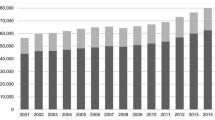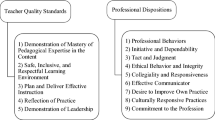Abstract
This research inquiry investigates the factors influencing chemistry teacher candidates’ development during their extended practica in the second and final year of an After-Degree Bachelor of Education at a university in central Canada. A variety of data sources are used to identify the risk and protective factors impeding and contributing to the achievement of their chemistry pedagogical aspirations. Two theoretical frameworks, both having their origins in the pioneering work of Kurt Lewin, are used to conceptualize how a complex amalgam of personal attribute and environmental factors and the interplay among these factors influence teacher candidate developmental trajectories. The tenets of both Bronfenbrenner’s bioecological model and Learning Environment research provide insights into how the factors influencing teacher candidate development can be understood and systematically documented to provide a template for reflective consideration of the practicum experience for both teacher candidates and those involved in fostering the development of chemistry teacher candidates.

Similar content being viewed by others
Notes
Bronfenbrenner describes development as the sustained, progressively more complex interaction with and activity in the immediate environment (Bronfenbrenner 2005, p. 97). This description will serve as the meaning for this term in this paper.
References
Baird, J. R. (1992). Collaborative teaching, systematic inquiry, better teaching. In T. Russell & M. Mundby (Eds.), Teachers and teaching from classroom to reflection (pp. 33–48). Bristol, PA: Falmer.
Bandura, A. (1977). Self-efficacy: Toward a unifying theory of behavioral change. Psychological Review, 84, 191–215.
Bronfenbrenner, U. (2005). Making human beings human: Bioecological perspectives on human development. London: Sage Publications.
Dalzell, R. (1997). The role of the practicum in teacher education. In B. Jeans (Ed.), Issues in teacher education: Policy practice: Vol. 2 (pp. 144–160). Victoria, Australia: Felicitas Academic.
Deaux, K., & Wrightsman, L. S. (1988). Social psychology. Pacific Grove: Brooks/Cole Publishing.
Fraser, B. J. (1998a). Science learning environments: Assessments, effects, and determinants. In B. J. Fraser & K. G. Tobin (Eds.), International handbook of science education (pp. 1–61). London: Kluwer.
Fraser, B. J. (1998b). Classroom environment instruments: Developments, validity and applications. Learning Environment Research: An International Journal, 1, 7–33.
Glickman, C. (1992). Introduction: Postmodernism and supervision. In C. Glickman (Ed.), Supervision in transition: The 1992 ASCD yearbook (pp. 1–3). Alexandria, VA: Association for Supervision and Curriculum Development.
Gustafson, B., Guilbert, S., & MacDonald, D. (2002). Beginning elementary science teachers: Developing professional knowledge during a limited mentoring experience. Research in Science Education, 32(3), 281–302.
Harvey, D. H. (2002). Agency and community: A realist paradigm. Journal for the Theory of Social Behaviour, 3, 163–194.
Henderson, J. A. (1992). Reflective teaching: Becoming an inquiring educator. New York: Macmillan.
Johnstone, A. H. (1991). Why is chemistry difficult to learn? Things are seldom what they see. Journal of Computer-Assisted Learning, 7, 701–770.
Lewin, K. (1935). A dynamic theory of personality. New York: McGraw-Hill.
Lewin, K. (1951). Field theory in social science; Selected theoretical papers. In D. Cartwright (Ed.) New York: Harper & Row.
Lewthwaite, B. E. (2000). Implementing science in the New Zealand Curriculum: How teachers see the problems. In G. Haisman (Ed.), Exploring issues in science education (pp. 11–23). Wellington, New Zealand: Research and Curriculum Division, Ministry of Education.
Lewthwaite, B. E. (2001). The development, validation and application of a primary science curriculum implementation questionnaire. Unpublished ScEdD Thesis, Curtin University of Technology, Perth, Australia. http://adt.curtin.edu.au/theses/available/adt-WCU20030717.155648/.
Lewthwaite, B. E. (2004). “Are you saying I’m to blame?” An analysis of a principal’s role in influencing science program delivery. Research in Science Education, 34(2), 155–170.
Lewthwaite, B. E. (2005). “It’s more than knowing the science”. A case study in elementary science curriculum review. Canadian Journal of Mathematics, Science and Technology Education, 5(2), 170–186.
Lewthwaite, B. E. (2006a). Constraints and contributors to science-teacher leader development. Science Education, 90(2), 331–347.
Lewthwaite, B. E. (2006b). “I want to enable teachers in their change”: Exploring the role of a superintendent on science curriculum delivery. Canadian Journal of Educational Administration and Policy, 22, 1–23.
Lewthwaite, B. E., Smith, K., & Hultin, P. (in press). Chemistry teacher teaching aspirations and perceived constraints and contributors to attaining these aspirations.
Lewthwaite, B. E., Stableford, J., & Fisher, D. L. (2001). Enlarging the focus on primary science education in New Zealand. In R. K. Coll (Ed.), SAMEpapers 2001 (pp. 213–237). Hamilton, New Zealand: Centre for Science and Technology Education Research, Waikato University.
Manitoba Citizenship and Youth (2005). Senior 3 Chemistry 30S: A foundation for implementation. Winnipeg, Manitoba, Canada: Manitoba Government Printers.
Paris, C., & Gespass, S. (2001). Examining the mismatch between learner-centered teaching and teacher-centered supervision. Journal of Teacher Education, 52(5), 398–412.
Ralph, E. (2001). Aligning mentorship style with beginning teachers’ development: Contextual supervision. Alberta Journal of Educational Research, 46(4), 311–326.
Ralph, E. (2002). Enhancing the professional development of teachers: The promise of “contextual supervision”. Brock Education, 11(2), 42–51.
Ralph, E. (2003). Enhancing mentorship in the practicum: Improving contextual supervision. McGill Journal of Education. Winter 2003. Accessed http://www.findarticles.com/p/articles/mi_qa3965/is_200301/ai_n9228169.
Riggs, I., & Enochs, L. (1990). Toward the development of an elementary teacher’s science teaching efficacy belief instrument. Science Education, 74, 625–638.
Rotter, J. B. (1954). Social learning and clinical psychology. New York: Prentice-Hall.
Schön, D. (1983). The reflective practitioner: How professionals think in action. San Francisco: Jossey-Bass.
Schön, D. (1987). Educating the reflective practitioner. San Francisco: Jossey-Bass.
Shulman, L. S. (1986). Those who understand: Knowledge growth in teaching. Educational Researcher, 15, 4–14.
Shulman, L. S. (1987). Knowledge and teaching: Foundations of the new reform. Harvard Educational Review, 57(1), 1–22.
Zimbardo, P. G. (1985) Psychology and life (11th ed.). Glenview, IL: Scott-Foresman.
Author information
Authors and Affiliations
Corresponding author
Additional information
This research project is supported by the Centre for Research, Youth, Science Teaching and Learning (CRYSTAL) at the University of Manitoba which receives its funding from the Natural Science and Engineering Research Council (NSERC) of Canada.
Rights and permissions
About this article
Cite this article
Lewthwaite, B.E. Towards Treating Chemistry Teacher Candidates as Human. Res Sci Educ 38, 343–363 (2008). https://doi.org/10.1007/s11165-007-9053-x
Received:
Accepted:
Published:
Issue Date:
DOI: https://doi.org/10.1007/s11165-007-9053-x




